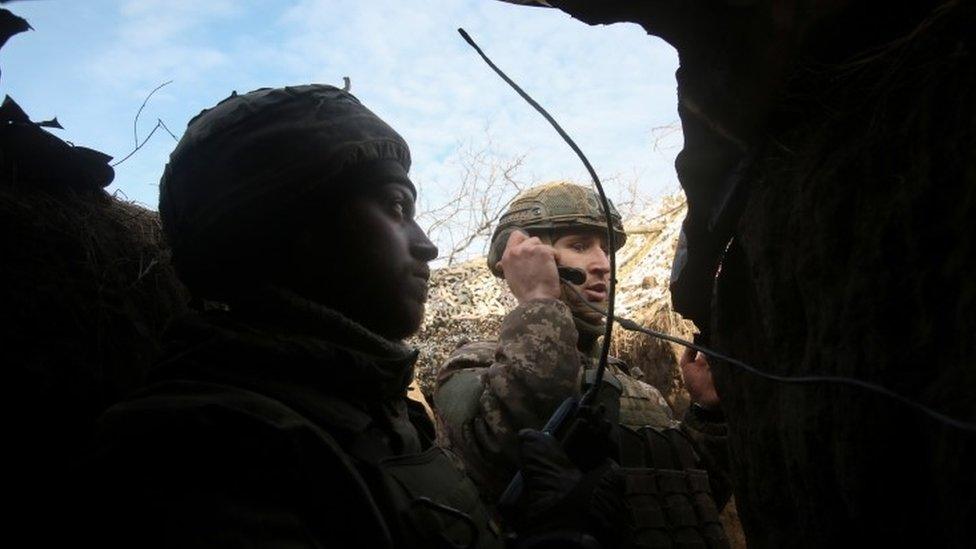Boris Johnson warns Vladimir Putin of deep concern over Ukraine
- Published

Boris Johnson has told Vladimir Putin about his "deep concern" over Russian forces amassing on Ukraine's border.
Tensions have been growing in the area, with Ukrainian authorities saying Moscow could be planning a military offensive at the end of January.
The two leaders spoke on Monday, with Mr Johnson reiterating the need to deescalate tensions through diplomacy.
But he also warned President Putin of "significant consequences" of any "destabilising action" by Russia.
Ukraine shares borders with both the EU and Russia, but as a former Soviet republic it has deep social and cultural ties with Russia.
However, Russia has accused Ukraine of provocation, and sought guarantees against eastward Nato expansion and deployment of weapons close to its border.
Last week, Mr Putin hardened his rhetoric over the situation in Ukraine, saying the war in the country's east where Russian-backed rebels have been fighting Ukrainian troops there since 2014 - looked like genocide.
But on Sunday, the G7 - including UK Foreign Secretary Liz Truss - warned Russia of "massive consequences" if it invades Ukraine.
Russian troop build-up: View from Ukraine front line
After the conversation between Mr Johnson and Mr Putin, Downing Street released a statement, saying the PM "expressed the United Kingdom's deep concern over the build-up of Russian forces on Ukraine's border, and reiterated the importance of working through diplomatic channels to deescalate tensions and identify durable solutions".
It added: "The prime minister emphasised the UK's commitment to Ukraine's territorial integrity and sovereignty, and warned that any destabilising action would be a strategic mistake that would have significant consequences."


Western powers are desperate to deter Vladimir Putin from invading Ukraine.
They do not know if that is his intention. But they believe he has enough military forces massed to the north and east of Ukraine to invade if he wants to.
Russia insists they are on regular training manoeuvres.
But in case President Putin decides to send his troops across the border, western leaders are doing everything they can to let him know that he would pay a high price.
The prime minister spoke of "significant consequences".
Other world leaders have spoken of "severe costs".
What they would be is not being spelt out, but the focus is largely on economic measures.
They might include curbing Russia's access to global financial markets and banking systems, limiting its ability to refinance its debt, as well as restricting gas exports.
What remains unclear is if Mr Putin will be deterred from military action or whether he is looking for diplomatic concessions instead.

As well as the ongoing tensions, the two leaders also discussed climate change.
In the statement, No 10 said the pair "welcomed progress" at the COP26 summit in Glasgow earlier this year, especially around protected forests, and agreed "UK-Russia collaboration is critical to deliver on the pledges".